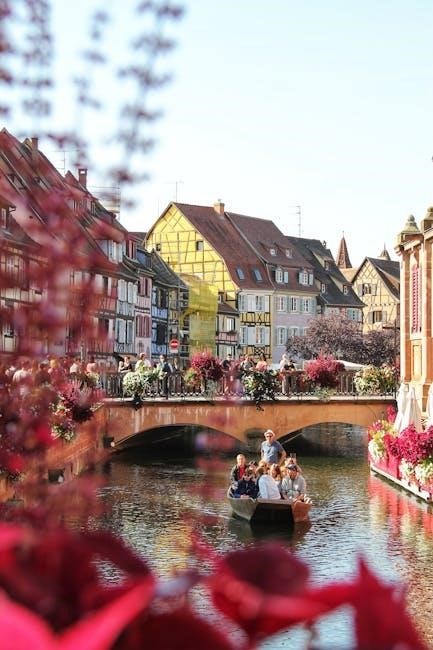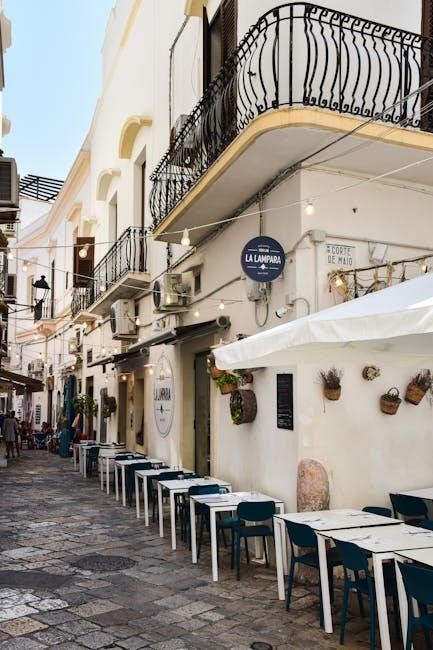Tipping European tour guides is a widespread cultural practice, though customs vary significantly across countries. It reflects appreciation for service quality and enhances the tour experience, with amounts differing based on regional norms and individual satisfaction.
Importance of Tipping in European Culture
Tipping in Europe is deeply rooted in cultural norms, reflecting appreciation for exceptional service and enhancing the overall travel experience. While practices vary, it is generally seen as a gesture of gratitude for tour guides, drivers, and support staff. Tipping demonstrates respect for the effort and knowledge shared, particularly in countries where tourism is a significant part of the economy. It also serves as a way to acknowledge the personalized attention and insights provided during tours. In many European countries, tipping is not mandatory but is widely expected and appreciated, especially for outstanding service. This practice reinforces the quality of service and fosters positive interactions between tourists and locals, making it a meaningful part of European cultural exchange.
Variability of Tipping Practices Across Europe
Tipping practices for European tour guides vary significantly across countries, reflecting diverse cultural and economic norms. In some nations, tipping is expected and standardized, while in others, it is discretionary and based on service quality. For instance, in France and Italy, tips are modest but appreciated, whereas in Ireland, generosity is common for exceptional service. Spain and Germany have regional differences, with tipping customs varying by area. Portugal and Eastern European countries lean toward voluntary tipping, often influenced by economic conditions. These differences highlight the importance of understanding local customs to ensure respectful and appropriate tipping. Researching specific country norms is essential for travelers to navigate tipping confidently and avoid misunderstandings during their tours.
Why Tipping is Important for Tour Guides
Tipping is essential for acknowledging guides’ hard work and expertise, showing appreciation for exceptional service, and encouraging high standards in the tourism industry.
Showing Appreciation for Excellent Service
Tipping European tour guides is a meaningful way to express gratitude for their dedication and effort. A well-timed tip acknowledges their expertise, enthusiasm, and ability to enrich your travel experience. Guides often go above and beyond, providing insightful information and ensuring smooth logistics. By tipping generously, you recognize their hard work and show appreciation for the memorable experiences they create. This gesture not only reflects your satisfaction but also motivates guides to continue delivering outstanding service. In many European countries, tipping is a cultural sign of respect, reinforcing the value placed on exceptional tourism professionals. It’s a simple yet impactful way to say thank you for making your trip unforgettable.
Setting Expectations for Future Service Quality
Tipping European tour guides plays a crucial role in maintaining high service standards. By rewarding guides with fair tips, you encourage them to uphold excellence in their work. This positive reinforcement creates a culture where guides strive to provide memorable experiences, knowing their efforts are valued. Consistent tipping also helps set clear expectations for future tours, as guides are motivated to deliver exceptional service to earn similar recognition. Over time, this practice fosters a professional and dedicated tourism industry. Your tip acts as a signal, shaping the quality of service for future travelers. It’s a way to contribute to the sustainability of outstanding tourism experiences across Europe.

Country-Specific Tipping Norms
Tipping practices vary significantly across Europe, influenced by cultural norms, economic conditions, and regional traditions. Understanding these differences ensures proper etiquette and appreciation for local customs.
France: Discretionary Tipping for Guides
In France, tipping tour guides is considered a gesture of appreciation rather than an obligation. For group tours, tipping €2-€5 per person is customary, while private tours may warrant €10-€20 per group. Guides in popular destinations like Paris often receive slightly higher tips due to demand. Restaurants and cafes typically include service charges, but leaving an additional €1-€2 per person is polite. Tipping is discretionary and reflects satisfaction with the service quality. Locals tend to tip modestly, so visitors should follow suit to blend in. Tipping in France is a nuanced practice, emphasizing gratitude without strict rules.

Italy: Tipping Customs in Tourist Services
In Italy, tipping is not mandatory but is appreciated for good service. For tour guides, tipping €5-€10 per person for a group tour is customary, while private tours may see higher amounts, around €10-€20 per group. In restaurants, leaving €1-€3 per person is common, as service charges are often included. For exceptional service, Italians might round up the bill or leave small change. Tipping in Italy is based on satisfaction and is generally modest compared to other countries. Locals tip discreetly, and visitors are encouraged to follow suit. Tipping practices vary slightly by region, but gratitude is always welcomed, reflecting the Italian appreciation for hospitality and quality service.
Spain: Regional Differences in Tipping
In Spain, tipping practices vary by region and context. In tourist-heavy areas like Barcelona or Madrid, tipping is more common, with 5-10% of the total bill typically left in restaurants and bars. For tour guides, €5-€10 per person for a day tour is customary, though this may increase in upscale regions like Catalonia or the Basque Country. In smaller towns or rural areas, tipping is less expected, and locals often round up the bill or leave small change. Regional differences also apply to private tours, where tips may be higher in popular destinations like Seville or Granada. Overall, tipping in Spain reflects local customs and the quality of service received, with variations depending on the region and type of service provided.
Germany: Standard Practices for Guides
In Germany, tipping practices are generally consistent across the country, with a focus on modest amounts. For tour guides, it is customary to tip between €5 and €10 per person for a half-day tour and €10 to €15 for a full-day tour. This amount may increase for private tours or specialized guides. In restaurants and bars, tipping 5-10% of the total bill is standard, rounding up the bill or leaving small change is common. Germans value good service and show appreciation through fair tipping, reflecting their respect for professionalism. Regional differences are minimal, making tipping practices relatively uniform nationwide. This approach ensures clarity and consistency for tourists and locals alike when engaging with tour guides and other service providers.
United Kingdom: Tipping Etiquette for Tour Guides
In the United Kingdom, tipping tour guides is customary but not mandatory, reflecting a culture of polite appreciation. For guided tours, tipping £10-£15 per person for a full-day tour is considered standard, while shorter tours might warrant £5-£10. In London, where tourism is prevalent, tipping may be slightly higher. Tips are often rounded up or given as small change, showing gratitude without being excessive. Tipping is less common in free walking tours, but contributing £5-£10 per person is appreciated for good service. The UK’s tipping culture emphasizes recognizing excellent service rather than adhering to strict rules, allowing visitors to express satisfaction based on their experience. This approach keeps tipping respectful and voluntary, aligning with British social norms.
Ireland: Generous Tipping for Exceptional Service
In Ireland, tipping tour guides is a gesture of appreciation for exceptional service, though it is not strictly mandatory. For guided tours, tipping €15-€25 per person for a full-day tour is common, while shorter tours might warrant €5-€10. Drivers on tours may also receive €10-€20 per day. In restaurants, tipping 5-10% of the total bill is customary, especially if no service charge is added. Irish culture values hospitality, and tipping reflects satisfaction with the service provided. While tipping is optional, it is deeply appreciated and seen as a way to acknowledge outstanding efforts. This generous approach aligns with Ireland’s friendly and welcoming reputation, making visitors feel connected to the local culture.
Portugal: Voluntary Tipping for Guides
In Portugal, tipping tour guides is voluntary but highly appreciated, reflecting satisfaction with the service. For group tours, tipping €5-€10 per person for a half-day tour and €10-€15 for a full-day tour is customary. For private tours, tipping €20-€30 per group is considered generous. Drivers on tours typically receive €5-€10 per day. Restaurants and cafés usually include a service charge, but leaving an additional 5-10% for exceptional service is welcomed. Tipping amounts vary based on the quality of service and the length of the tour. This practice aligns with Portugal’s welcoming culture, where showing gratitude for excellent experiences is valued. Tipping is not obligatory but is a thoughtful way to acknowledge hard work and dedication.
Eastern Europe: Emerging Tipping Trends
In Eastern Europe, tipping practices for tour guides are evolving, with varying customs across countries. In Poland, Hungary, and the Czech Republic, tipping is becoming more common, especially in tourist-heavy areas. Locals may tip 5-10%, while tourists often give 10-15% for good service. In countries like Croatia and Slovenia, where tourism is booming, tipping is more widespread, with €10-€20 per person for a half-day tour being typical. Some regions still view tipping as optional, but as tourism grows, so does the expectation of gratuity. Guides who provide exceptional experiences often receive higher tips, reflecting a growing appreciation for quality service. This shift highlights the blending of local traditions with Western influences, creating a diverse tipping landscape.

Tipping in Specific Scenarios
Tipping varies based on the situation, ensuring fairness and appreciation. Different scenarios require tailored approaches, reflecting local customs and service quality to enhance your travel experience.

Group Tours: Recommended Tipping Guidelines
For group tours, tipping is typically collective, with participants contributing equally. A common guideline is €3–€6 per person per day for the guide, depending on the tour’s length and quality of service. If the tour includes additional staff, such as drivers, consider tipping them separately, around €1–€2 per person per day. Some tour companies may suggest a pooled tip collected at the end of the tour. Always adjust based on the guide’s performance and your satisfaction. Cultural norms vary across Europe, so research local customs beforehand to ensure appropriate tipping. This approach ensures fairness and reflects the overall experience provided by the tour team.
Private Tours: Customary Tipping Amounts
For private tours, tipping amounts are typically higher than for group tours, as the guide provides personalized attention. A customary tip ranges from 10% to 20% of the total tour cost, depending on the guide’s expertise and the tour’s length. For example, if the tour costs €100, a tip of €10–€20 is appropriate. Some travelers also consider the guide’s additional efforts, such as arranging exclusive access or providing in-depth insights. Regional variations exist, but the standard remains consistent across Europe. Tipping in cash is preferred, though some guides accept credit card payments. This practice ensures a direct expression of satisfaction for exceptional, tailored service.
Restaurants and Bars: Tipping Practices
Tipping practices in European restaurants and bars vary by country but generally follow certain norms. In most cases, tipping is not mandatory but is appreciated for good service. In France, it’s customary to leave 5–10% in restaurants, while in Italy, leaving 1–2 euros per drink or 5–10% of the meal total is standard. In Germany and the UK, 5–10% is typical for restaurant meals. For bars, rounding up the bill or leaving a few coins is sufficient. Some establishments include a service charge, so check the bill first. Tipping in cash is preferred, though credit card payments are increasingly accepted. These practices reflect local customs and are a way to express gratitude for hospitality and service quality.
Drivers and Other Support Staff: Tipping Norms
Tipping drivers and other support staff, such as porters or hotel assistants, is a common practice in Europe to show appreciation for their services. For drivers on group tours, €1–2 per person per day is considered standard, while for private tours, a fixed amount of €10–20 per day is typical. Porters at hotels or train stations typically receive €1–2 per bag. These tips are not mandatory but are widely expected as a gesture of gratitude for helpfulness and efficiency. Regional differences may influence tipping amounts, but the general guideline is to tip based on the quality of service received. Always consider local customs and economic conditions when deciding how much to give.
How Much to Tip Tour Guides
Tipping tour guides varies, but a common guideline is €10–€20 per person for a half-day tour, increasing for full-day or exceptional service.

Guidelines for Group Tours (Per Person)
For group tours, tipping typically ranges from €10 to €15 per person for a half-day tour and up to €20 for a full-day tour. These amounts are per person, not per group, and are considered standard across most European countries. For example, in France, Italy, and Spain, tour guides often receive €10–€15 per person for a half-day tour, while in the UK, tips may slightly exceed this range. Adjustments can be made based on the quality of service, with exceptional guides deserving higher amounts. Budget travelers may opt for the lower end, while luxury tours often warrant more generous tips. Remember, these are general guidelines, and the final amount should reflect your satisfaction with the tour experience.
Recommendations for Private Tours (Per Group)
For private tours, tipping guidelines vary based on the group size and tour duration. A common recommendation is to tip between €30 and €50 per group for a half-day tour and €50 to €100 for a full-day tour. In Western Europe, such as France or Italy, private tour tips often range from €50 to €100 for a half-day, while in Eastern Europe, the range may be slightly lower, around €30 to €50. These amounts are per group, not per person, and should reflect the quality of service provided. If the guide offers exceptional insight or personalized attention, consider tipping on the higher end of the scale. Adjustments can also be made based on the group’s size and overall satisfaction with the experience.
Tipping Drivers: Standard Amounts
Tipping drivers in Europe typically ranges between €1 to €3 per person for group tours, depending on the service quality and duration. For private tours, tipping amounts are slightly higher, often €5 to €10 per person for a half-day tour and €10 to €15 for a full-day tour. In some countries, like the UK and Germany, tipping drivers is customary, while in others, such as France, it’s less expected but still appreciated. For luggage assistance, tipping €1 to €2 per bag is standard. These amounts are per group, not per individual, and should reflect the driver’s professionalism and helpfulness. Tipping is usually given at the end of the service, ensuring it aligns with the quality of care provided during the tour.

Adjusting Tips Based on Service Quality
Tip amounts for European tour guides should reflect the quality of service received. For exceptional guidance, such as detailed insights, enthusiasm, and helpfulness, consider increasing the tip by 10-20%. Conversely, if the service was subpar or the guide seemed disengaged, it’s acceptable to reduce the tip or explain your feedback. In group settings, observe how others contribute to ensure fairness. For private tours, adjust the tip based on personalized attention and effort. Rounding up to the nearest convenient amount is also a thoughtful gesture. Remember, tipping is voluntary but should align with the value received. Adjustments ensure that hardworking guides are rewarded, while others are encouraged to improve.

Factors Influencing Tipping Decisions
Service quality, tour duration, regional economics, and personal satisfaction significantly influence tipping decisions. Cultural norms, group size, and guide expertise also play a role in determining tip amounts.
Quality of Service Provided
The quality of service is a primary factor influencing tipping decisions for European tour guides. Guides who demonstrate extensive knowledge, engage the group effectively, and provide personalized insights often receive higher tips. Professionalism, punctuality, and the ability to adapt to the group’s needs also play a significant role. If a guide goes above and beyond, such as recommending local hidden gems or handling unexpected situations smoothly, it positively impacts the tipping amount. Conversely, a lackluster performance may result in smaller tips. The perceived value of the experience directly correlates with the generosity of the tip, making service quality a cornerstone of tipping decisions.
Length and Type of Tour
The length and type of tour significantly influence tipping amounts for European tour guides; Longer tours, such as multi-day excursions, often result in higher tips due to the guide’s extended involvement and effort. Conversely, shorter tours may lead to smaller tips, as the interaction time is limited. Additionally, the type of tour—whether it’s a historical walking tour, food tour, or adventure activity—affects tipping. Specialized tours requiring unique expertise or physical effort may prompt generosity. The more engaging, informative, or challenging the tour, the more likely participants are to tip generously. This reflects the tour’s overall value and the guide’s dedication to creating a memorable experience.

Regional Economic Differences
Regional economic differences across Europe play a crucial role in shaping tipping practices for tour guides. In wealthier countries with higher living costs, such as those in Western Europe, tips tend to be more generous to align with local economic standards. Conversely, in regions with lower average incomes, such as parts of Eastern Europe, tipping amounts may be smaller due to economic constraints. Additionally, areas with thriving tourism industries often see higher tipping expectations, as locals are more accustomed to serving international visitors. These economic disparities highlight the importance of understanding regional norms to ensure fair and respectful tipping practices during your travels.

Tipping European tour guides varies widely, reflecting cultural, economic, and regional differences. Researching local norms ensures respectful and fair compensation, fostering positive interactions during your travels.
Key Takeaways for Tipping European Tour Guides
Understanding local tipping customs is essential for respectful and fair compensation. Researching regional norms ensures appropriate gestures, reflecting cultural values and service quality. Tipping amounts vary widely, influenced by factors like tour length, group size, and economic conditions. In countries where tipping is discretionary, such as France or Portugal, small amounts are appreciated. In others, like Ireland or the UK, higher tips are expected for exceptional service. Consistency in tipping fosters positive interactions and supports the tourism industry. Always consider the guide’s effort, knowledge, and professionalism when determining tip amounts. Responsible tipping enhances your travel experience and leaves a positive impression on local communities.
Encouraging Responsible and Respectful Tipping
Responsible tipping fosters a positive and respectful exchange between travelers and tour guides. It’s important to align tips with local customs and the quality of service received. Over-tipping can create unrealistic expectations, while under-tipping may undervalue the guide’s efforts. Researching regional norms beforehand ensures thoughtful and fair compensation. Encouraging transparency about tipping practices helps maintain trust between travelers and service providers. By tipping responsibly, travelers contribute to the sustainability of the tourism industry and promote a culture of mutual respect. This approach enhances the overall travel experience for both visitors and locals alike, fostering harmony and understanding.
